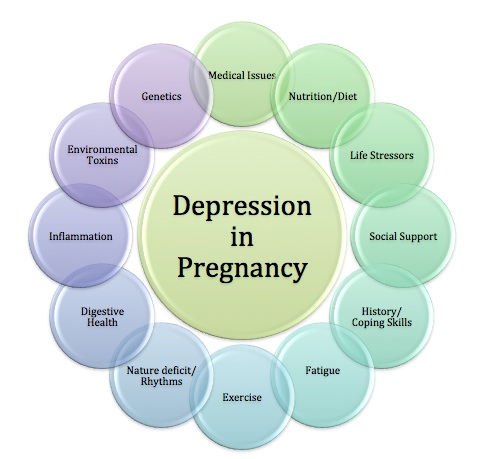I share my experience with depression and pregnancy. I was a few weeks into my first pregnancy. I’d recovered from the shock and surrealness of learning I had actually conceived and was carrying a baby. Waiting for the expected sensations of joy and electrifying excitement to erupt, that never came. I began to be frustrated that I wasn’t feeling giddy about it, having a feeling of guilt for my unnatural lack of exuberance. It was all there in my head, the thoughts of wonder and gladness, but I wasn’t feeling it.
Depression and Pregnancy – Feelings of Despair
I didn’t have mood swings, like the TV jokes predict of all pregnant, hormonal women. My mood was constantly negative. Anxiety ravaged me. Everything seemed bleak.
The guilt of feeling this way when I should be the happiest woman alive because of my pregnancy was unyielding. Any time I was unhappy about anything in life I capsized.
“Life is awful. I can’t handle it anymore.”
Frustration and tension abounded. My response to everything was negative.
Then well into my fourth month, I took it upon myself in a fit of despondency to re-arrange the bedroom. My husband was at work and wouldn’t be home for several hours. I didn’t feel like waiting for him and I needed a change.
I moved all of our furniture, all by my little pregnant self. It was exhausting! And when I had everything situated, I hated it!
I knew exactly what thoughts and feelings were going to erupt.
“This is awful! We have the lousiest bedroom on earth! How can we possibly have a baby when we have such a crappy bedroom? I did all this work and I hate it and I hated it the way it was before and now my life is over because there is no way I can ever like this room no matter what I do.”
I waited for the thoughts and feelings to overcome me.
First Trimester Pregnancy Hormones
But then a voice of reason rose up. The first one I’d accomplished in four months. It said,
“Wait a minute. You’re just not used to this new look for your room. Get in bed and relax and see how you like it in the morning.”
I obeyed the sweet sound of rational thinking. To my relief, I loved the room by the time my husband arrived home from work later that night. I proudly showed him everything I’d changed and bragged about how tough I was to do it all by myself.
The next day I realized that among the many agonizing symptoms of my first trimester (and longer) was depression. And, thank goodness, it had eased like all the other symptoms were beginning to. I wish I had known at the time, that what I’d been experiencing emotionally, was depression caused by the hormones of pregnancy. Then I wouldn’t have been so tempted to think that I was just a lousy, unnatural woman who couldn’t be happy to be pregnant.
Feeling Depressed During Pregnancy is Normal
Nothing I’d read about pregnancy (and I read tons) mentioned depression as a side effect of pregnancy. I finally came across something about it in a magazine late in my third trimester.
 Now, over two years later, I’m noticing more and more information on it cropping up.
Now, over two years later, I’m noticing more and more information on it cropping up.
I’m glad to find out that it is a normal thing for women to go through, and that every unhappy, negative thing I thought and felt during that time was natural, that there’s no reason to feel guilty for it, and there’s help to deal with it.
As of yet, it’s still uncommon for a doctor to ask his/her patient if she is experiencing depression when he/she inquires into a pregnant woman’s symptoms.
I tell every newly pregnant woman I know that it is possible that pregnancy may make her feel depressed, that she shouldn’t feel guilty if she doesn’t feel overjoyed, and that she can and should speak with her doctor about depression if she feels like she’s overly negative towards others and feeling underwhelmed.
Depression and Pregnancy Treatments
As far as treatment goes… well that isn’t clear-cut and can be controversial.
Yes, there are antidepressants that can be taken during pregnancy. Antidepressant drugs do cross the placenta into the baby’s bloodstream, although the effect to the baby is undetermined at this time.
It is important to discuss with your doctor the degree of your depression and weigh the need for treatment against the possible risks to your baby.
Depression during pregnancy increases a mother’s risk of also experiencing postpartum depression. And if a woman has previously experienced depression in her life, she is more likely to have depression triggered by pregnancy.
What is Depression?
Our society talks so much about depression these days that it’s difficult to know what depression is.
 We all know what it’s like to “feel depressed” at times. That’s not uncommon and not unhealthy. But clinical depression, known so commonly today by the buzz word “depression” is a much more significant experience than that, and deserves special attention.
We all know what it’s like to “feel depressed” at times. That’s not uncommon and not unhealthy. But clinical depression, known so commonly today by the buzz word “depression” is a much more significant experience than that, and deserves special attention.
If you hear a list of symptoms of depression named off, and notice tears of self-sympathy spring to your eyes, then you can bet that you have experienced some degree of clinical depression. But for the record, depression consists of continual feelings, moods and thoughts that last for two weeks or more, such as: listlessness, despair, negativity, anxiety, frustration, sleeplessness or wanting to sleep all the time, lack of appetite and weight loss or weight gain due to emotional eating, frequent bouts of crying, lack of pleasure and interest in life, suicidal thoughts, lack of motivation for everyday functions, lack of focus.
You get the idea?
Hearing depression spelled out in detail often is the easiest way for someone experiencing it to realize what she’s dealing with. Otherwise, it can be easy to overlook, because you’re so busy trying to snap out of it.
In addition, a woman who is pregnant will feel notable lack of enthusiasm about her pregnancy, may resent her baby, and may have thoughts of aborting the pregnancy. She may be able to think only about the more negative attributes of pregnancy, babies and childbirth (such as getting fat with the progression of the pregnancy, dealing with a newborn crying all night, and the pain of delivering the baby).
Speak With Your Doctor
I never even considered speaking with my doctor about how I was feeling. I didn’t see my doctor as someone I could approach with the emotional needs of my pregnancy. And ultimately I felt too ashamed of how I was feeling to admit it to anyone. So, I want to encourage women with similar experiences to discuss their feelings with their doctors.
The more pregnancy-related depression becomes evident, the more doctors will recognize it as something needing to be monitored, like nausea and weight loss etc. It stems from pregnancy hormones, just like morning sickness and outrageous headaches and fatigue.
Feeling negative and unhappy during pregnancy is not a woman’s fault.
In most cases, the symptoms will ease as the first trimester ends, and the only treatment really needed is confirmation that it’s just hormones and nothing to feel bad about. You don’t have to be overjoyed right now. You just have to be pregnant and take care of yourself. Joy will come!
In addition, it’s also been determined that women who experience postpartum depression may experience it to a greater degree with each additional pregnancy. Because of the delicate nuances of hormones, individual personality and life experience, each woman’s reaction to the discomforts and mental pressures of pregnancy will differ.
Pay attention to any negativity that concerns you while pregnant and within the first year of delivering your baby.
If there is another reason for your depression, such as psychiatric disorders, your Doctor will be able to identify it and help you accordingly.
Support Other Pregnant Women and New Mothers
Also, always offer an encouraging word to women who are pregnant or are adjusting to a new baby. People who experience depression are experts at hiding it and withdrawing from the support of others. So, make an effort to uplift the women around you who are vulnerable to depression and pregnancy.
Do this even if they are appearing to feel okay, all women who are pregnant, or who have a new baby need encouragement, support, and positive feedback.
Requiring information and support? Call the Helpline.




